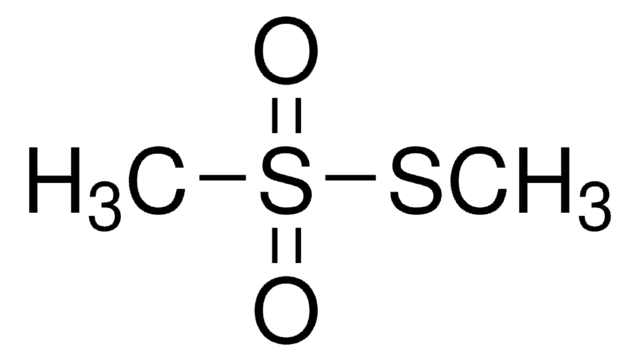50187
Ammonium 2-(methylthio)ethanesulfonate
≥97.0% (TLC)
Sinonimo/i:
Methyl coenzyme M ammonium salt
Autenticatiper visualizzare i prezzi riservati alla tua organizzazione & contrattuali
About This Item
Formula empirica (notazione di Hill):
C3H11NO3S2
Numero CAS:
Peso molecolare:
173.25
Numero MDL:
Codice UNSPSC:
12352106
ID PubChem:
NACRES:
NA.25
Prodotti consigliati
Saggio
≥97.0% (TLC)
Stringa SMILE
N.CSCCS(O)(=O)=O
InChI
1S/C3H8O3S2.H3N/c1-7-2-3-8(4,5)6;/h2-3H2,1H3,(H,4,5,6);1H3
FSGSBLDVKBYXIK-UHFFFAOYSA-N
Applicazioni
Ammonium 2-(methylthio)ethanesulfonate (Methyl coenzyme M) is converted into methane by the enzyme Methyl-coenzyme M reductase (MCR) derived from methanogenic archaea. Methy-coenzyme M is used in studies on methanogenic (methane-producing) enzymatic processes.
Confezionamento
Bottomless glass bottle. Contents are inside inserted fused cone.
Codice della classe di stoccaggio
11 - Combustible Solids
Classe di pericolosità dell'acqua (WGK)
WGK 3
Punto d’infiammabilità (°F)
Not applicable
Punto d’infiammabilità (°C)
Not applicable
Certificati d'analisi (COA)
Cerca il Certificati d'analisi (COA) digitando il numero di lotto/batch corrispondente. I numeri di lotto o di batch sono stampati sull'etichetta dei prodotti dopo la parola ‘Lotto’ o ‘Batch’.
Possiedi già questo prodotto?
I documenti relativi ai prodotti acquistati recentemente sono disponibili nell’Archivio dei documenti.
L G Bonacker et al.
European journal of biochemistry, 217(2), 587-595 (1993-10-15)
Methyl-coenzyme M reductase (MCR) catalyses the methane-forming step in the energy metabolism of methanogenic Archaea. It brings about the reduction of methyl-coenzyme M (CH3-S-CoM) by 7-mercaptoheptanoylthreonine phosphate (H-S-HTP). Methanobacterium thermoautotrophicum contains two isoenzymes of MCR, designated MCR I and MCR
J T Keltjens et al.
European journal of biochemistry, 172(2), 471-476 (1988-03-01)
Cell-free extracts of Methanobacterium thermoautotrophicum (strain delta H) were found to contain high concentrations of inorganic pyrophosphate (up to 40 mM). The compound was accumulated by the organism despite high activity of inorganic pyrophosphatase which was found to be present
P E Rouvière et al.
Journal of bacteriology, 170(9), 3946-3952 (1988-09-01)
When titanium(III) citrate was used as electron donor for the reduction of methyl coenzyme M by the methyl coenzyme M methylreductase system of Methanobacterium thermoautotrophicum delta H, component A1 was no longer required. The simpler system thus obtained required components
D A Grahame et al.
Biochemical and biophysical research communications, 147(1), 254-258 (1987-08-31)
Buffer-soluble extracts of acetate-grown Methanosarcina barkeri catalyzed methanogenesis from acetate in the presence of hydrogen and ATP. The rates of methane formation from either acetate plus ATP, or acetylphosphate without ATP added, were approximately doubled by the addition of coenzyme
Corinne Biderre-Petit et al.
FEMS microbiology ecology, 77(3), 533-545 (2011-05-21)
Lake Pavin is a meromictic crater lake located in the French Massif Central area. In this ecosystem, most methane (CH(4)) produced in high quantity in the anoxic bottom layers, and especially in sediments, is consumed in the water column, with
Il team dei nostri ricercatori vanta grande esperienza in tutte le aree della ricerca quali Life Science, scienza dei materiali, sintesi chimica, cromatografia, discipline analitiche, ecc..
Contatta l'Assistenza Tecnica.






